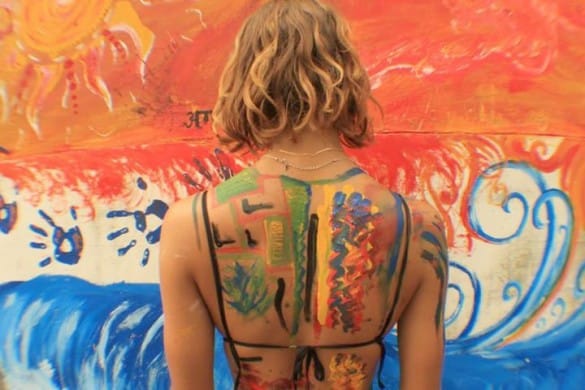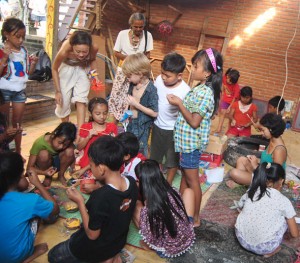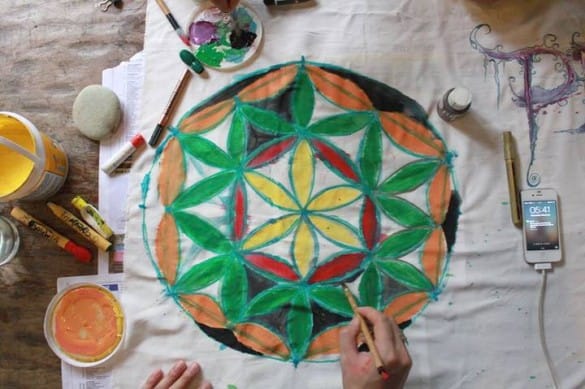
On past weekends I’ve often woken up with a hangover – my day’s almost over and I’m feeling too lazy to cook. Back then, I didn’t question the way in which I socialized on my weekends. Until I met the Permablitz crowd in Ubud, Bali earlier this year.
Permablitz Bali are a group of fun, sociable friends of different ages and backgrounds who meet up every weekend in order to make urban, edible gardens together. But this crowd is anything but geeky; many of them are musicians, dancers and artists and all of them are bonded by their passion for sustainable living. I first attended a Permablitz Bali event at the Kaleidoscope Community House in Ubud, Bali in February and learnt more about this urban permaculture movement.
Permaculture (permanent agriculture) is a science that was developed by Bill Mollison in Australia in the 1970s. It encourages communities to live sustainably and in harmony with the environment by developing systems that mimic the patterns of nature. Just as nature recycles nutrients and energy, in a permaculture model all energy, water and organic waste are returned back into a functioning system. Waste no longer exists – everything becomes a potential resource.
But how did this agricultural movement move into the cities? It all began in Melbourne in 2006 when permaculture designer Dan Palmer and a group of friends from South America decided that they wanted to start growing organic food in their own suburban backyards. The movement has since taken flight across Australia, Hawaii, America, Barcelona and now Jogjakarta and Bali.
Permablitz Jogja member Krishna first explained about the concepts of permaculture to a small group of friends from Bali, including Canggu resident Djuca Terenzi. “At that time only a few of us were gardening. Inspired by Krishna’s work with Permablitz Jogja, a few of us gathered together and that was the beginning of Permablitz Bali,” explained Djuca.
At Kaleidoscope Community House, a Permablitz event is held in the garden and everyone is busy preparing soil beds and building bamboo arches. As dusk draws in, we eat and rest in the lounge and a group begin to play music on guitars and djembe drums. Soon, a few of us dance – I feel completely relaxed.
“It has bonded us; we know we’re going to do something constructive,” added Djuca. “It is a gathering and not only are we not spending any money, but it also creates energy, it is creating yield. We are no longer wasting our days – we flipped it – and now it has become our passion. It becomes awareness, real information and at the same time knowledge; each week we learn more about gardening. We are doing something real, it’s not artificial – we are just being ourselves – bringing our music, bringing our art and it becomes really bonding.”
Some of the members have been involved in permaculture for years, but many are young and are already planning sustainable lifestyles for themselves. In this online information age, many people are becoming aware about the health and environmental problems associated with commercial farming which often uses lots of pesticides and fertilizers. Chemical fertilizers, which kill bacteria and thus reduce the soil’s productiveness, are not used in permaculture; organic compost and mulch are applied instead to enrich the soil. In permaculture, wild areas are deliberately protected to provide shelter for insect predators which remove insect pests in a balanced system; pesticides are no longer required. “Find out where your food comes from – the insane process of bringing food to your plate. You don’t realise it until you plant a seed – and start getting it right and it grows – then you put that food on your plate and you realise the satisfaction of being independent. You know what’s healthy, nutritious and organic,” said Djuca.
Awareness is key and movements like Permablitz are helping to broaden knowledge about the importance of good food, but sometimes it helps to learn in a practical setting, which is why Permablitz Bali often organizes workshops. “Whatever anyone wants to do, we discuss it first and then we invite someone who can explain about the workshop – we have done cob, dance, music, cooking, geodesic domes and sustainable living workshops,” said Djuca.
Keen to learn more, I join another Permablitz event at Kaleidoscope for the re-opening of the community project Rumah Idea. This grassroots initiative, which was started by Rizky Tizar and a group of friends, aims to promote sustainable living. Rizky focuses on the following four aspects:
- Permaculture – local community gardens
- Recycling
- Knowledge – English language and information about the environment
- Old traditions (so that they don’t go extinct) – learning from older generations
“IDEA stands for Indonesian Development of Environmental Education and Agricultural Studies,” said Rizky. “At first, Rumah Idea was developed at an abandoned house in Sibang by planting a garden and promoting sustainable living. We did not preach, but led by example. In Sibang, a language barrier remained between the local villagers and the Green School children so we began to teach the children English and increase awareness about certain issues. If we are aware of what’s happening, then we can fix the situation.”
Rizky met Djuca at a permaculture conference a few years back, and they were bonded by their similar visions and interests. The re-opening of Rumah Idea at Kaleidoscope was held on 24 March and not only were many seeds planted, but various workshops and games took place including traditional Balinese dance and art workshops followed by food and live music by The Mangrooves. Balinese teacher, Aji Dewa Made Artha, also volunteered by teaching traditional songs with Rizky to the children. In the past, Aji was a teacher at a museum in San Diego, California.
Now the Permablitz Bali team is hoping to recruit more members and will attend two upcoming events. They will be holding a stall and doing a talk on Earth Day (April 22nd) at Green School and they are also preparing for their next Pechakucha event on the 22nd of April.
In the case of the Permablitzers, it doesn’t matter so much what you eat – because you are what you grow.
How to get involved:
You just have to show up at a Permablitz event and once you get into the rhythm, then you can host your own blitz – it is expected for the host to provide food for the blitzers and to contact us ([email protected]) if you would like any further information.
To find out about the next events please visit: www.permablitzbali.org
Permablitz Bali on Facebook: www.facebook.com/Permablitzbali
Permablitz Jogja: www.facebook.com/permablitzjogja
To volunteer with Rumah Idea, visit the website: www.facebook.com/RumahIdea
Kaleidoscope Community House in Petulu, Ubud: www.facebook.com/Kaleidoscope




